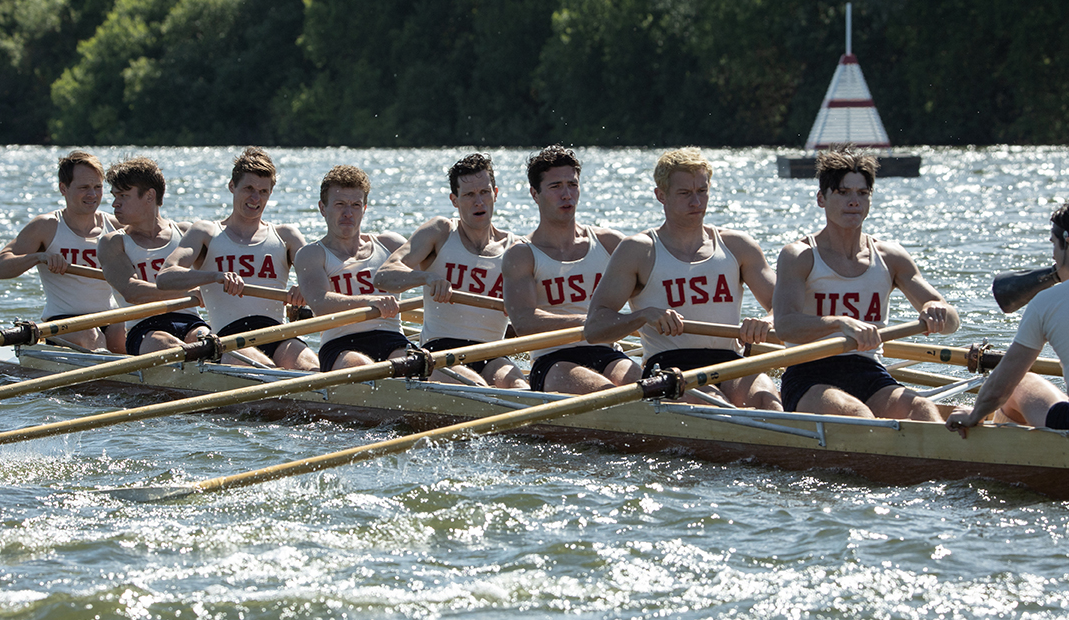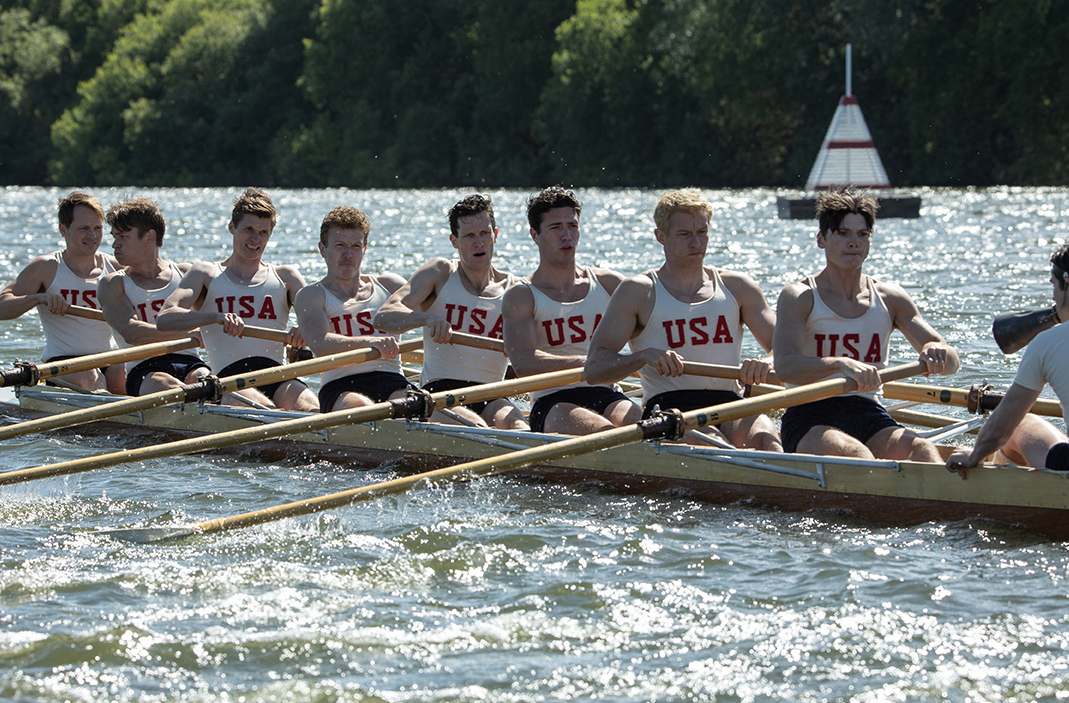
Reeder’s Movie Reviews: The Boys in the Boat
Read
When a group of scrappy have-nots apply an all-out, can-do attitude to a seemingly impossible task, they can sometimes make history. In fact, their achievements can become the stuff of legend.
The University of Washington (junior varsity) crew which rowed for gold at the 1936 Olympic Summer Games in Berlin captured the imagination of the world. Daniel James Brown told their remarkable story in his thoroughly researched and eminently readable book, The Boys in the Boat, published a decade ago. PBS produced an insightful documentary about them, The Boys of ‘36, which first aired in 2017. Now, producer-director George Clooney and his team have adapted it for the big screen. Emotion, if not originality, gets it to the finish line.
If you’re familiar with Seattle–and more specifically, the Montlake Cut, where the UW crew races take place–you’re going to be disappointed. Because of campus development over the past seventy years, it no longer has its 1930s look. As a result, most of the production took place in the Thames River Valley. It, too, has a rich history in the sport, but it hardly looks like the Northwest. Clooney had the ASUW Shell House recreated in England as well.
With a narrative already brimming with dramatic potential, the challenge for the filmmaker lay in combining the personal stories of the historical figures with the intricacies of their sport. Ideally, it should also involve fresh ways to avoid the usual tropes. A little too often, this version of The Boys in the Boat does little more than skim the surface.
Two characters emerge as the principals here. UW rowing coach Al Ulbrickson (Joel Edgerton) and team member Joe Rantz (Callum Turner) help galvanize the disparate, working-class group of young men who populate the boat, named “The Husky Clipper.” The coach faces the usual pressures from boosters and the university administration to produce a winning season, beginning with the West Coast rivalry with the much better-financed University of California. Rantz pursues engineering and rowing as a means of escaping poverty and overcoming the resentment borne of his father’s abandonment of him. Both Ulbrickson and Rantz are repressed characters, prone to subtle gestures and relatively few words. That dynamic mutes much of the storytelling. Even the coach himself remarks, “We need an edge.”
The class divide during the Great Depression serves as a major, recurring theme in the movie. From shoes with holes in them to a wide, effective view of Seattle’s “Hooverville,” Clooney emphasizes the plight of the crew and their adopted city. When they qualify for the national championship regatta in Poughkeepsie, New York, the longtime Seattle sports journalist Royal Brougham tells his radio audience that the UW race against Cal-Berkeley and Ivy League schools pits “old money versus no money at all.”
On balance, though, the script by Mark L. Smith (The Revenant) offers too few memorable lines and too little depth to most of the characterizations. Among them, Peter Guinness lends a thoughtful, avuncular quality to the role of George Pocock, the team’s British boatbuilder. Luke Slattery brings the brash energy as the coxswain, cajoling and driving his crew. And Hadley Robinson registers in a sweet, flirtatious way as Joe’s love interest.
The cinematographer, Martin Ruhe, and the production designer, Kalina Ivanov, make admirable contributions to the picture. The mostly subtle palette of browns and gray-blues suits the historical setting, along with careful attention to period detail. The gliding grandstands on rails are a standout.
Where Clooney, working with editor Tanya Swerling (The Tender Bar) most notably succeeds is in calibrating this underdog story to its personalities and capturing the essence of rowing itself, described by Pocock as “more poetry than sport.” The physical exertion of the team in the boat; the clicking and dipping of the oars; the fusing of character and athleticism on the water. That’s where Clooney really connects with his subject matter and his audience. And the original score by Academy Award-winner Alexandre Desplat (who also scored another sports-themed movie this year, the inspirational Nyad), beautifully suggests rowing’s grace and power.
When the Huskies reach Berlin, the story briefly introduces two famous historical figures. One remains mute, while the other makes a brief, pungent comment that still resonates today. If this new film version of The Boys in the Boat seems excessively cautious and smooth around the edges, just let the emotion wash over you at the climax.
















